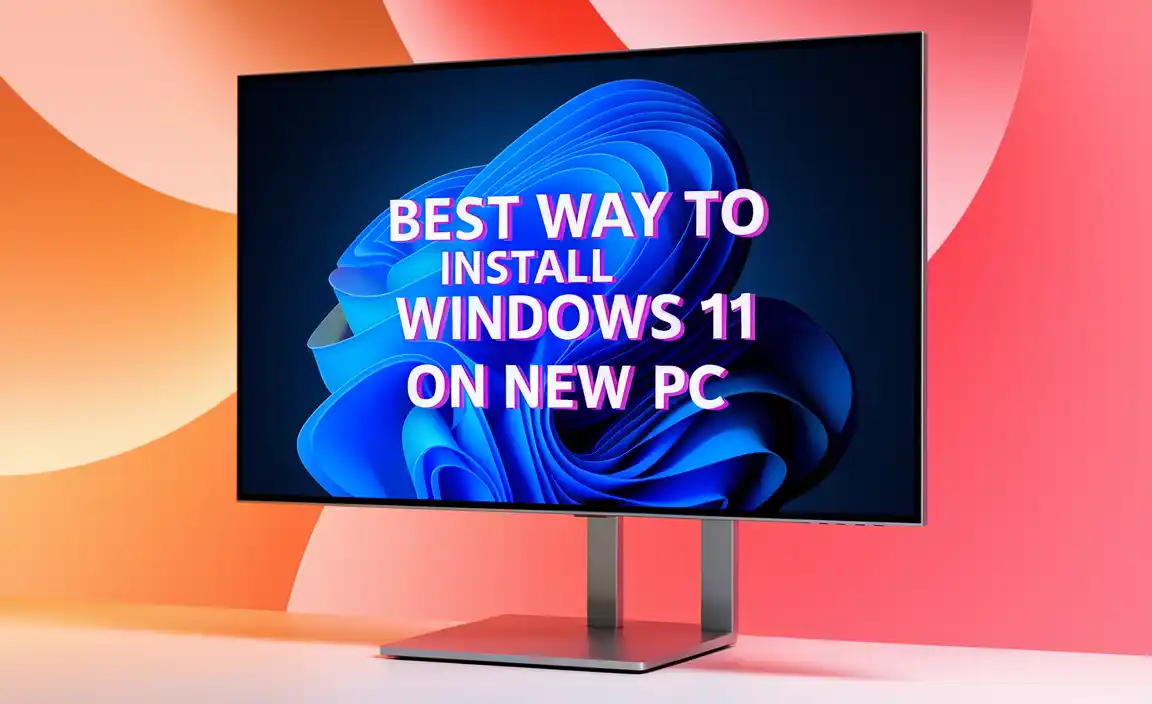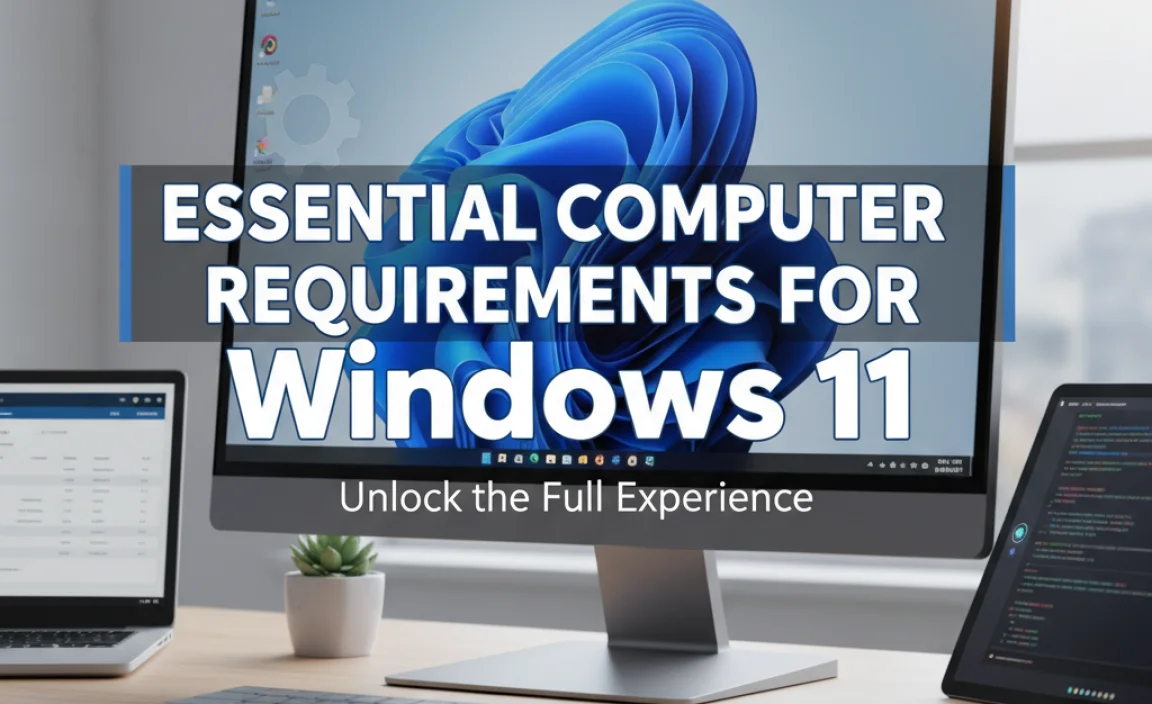Have you ever wondered why some computers are not eligible for Windows 11? This new version brings exciting features. But, some users can’t upgrade. Imagine your favorite game getting a big update and your console can’t handle it. Frustrating, right? Many computer owners feel the same. Microsoft set requirements for Windows 11 that not all PCs meet. Do you think your computer can upgrade?
Let’s explore why this happens. It’s like a mystery. Computers need certain parts to run Windows 11. These parts are like puzzle pieces. They must fit the requirements perfectly. If a piece is missing, the puzzle is incomplete. So, which part might be missing from your computer? The answer might surprise you!
Join us as we dive into the world of Windows upgrades. We’ll uncover the facts and maybe find a solution. Will you discover if your computer can make the leap to Windows 11? Or will you be left waiting, eager for a future fix? The journey begins here.
Devices Not Eligible for Windows 11

Windows 11 brings fresh features. But not all devices can join the fun. Why not? Many older computers lack necessary hardware. Microsoft set higher requirements this time. A modern processor and some security tools are needed. Imagine your old laptop knocking on the door, but it has no key! Frustrating, right? Here’s a tip: Check if your device supports Secure Boot and TPM 2.0. If not, it might be time to consider an upgrade. Don’t be left out of the Windows 11 buzz!
Minimum System Requirements for Windows 11

Explore the key hardware specifications needed. Discuss the importance of compatibility features like TPM 2.0 and Secure Boot.
So, you’re curious if your computer wants to join the Windows 11 party? Let’s check the guest list! First, your machine needs a 1 GHz or faster processor, a bit speedy for electronics but not okay for turtles (unless it’s a turbo turtle). It should also have at least 4 GB of RAM; that’s *Random Awesome Memory* for techies.
Our PC should have 64 GB of storage; that’s like asking your gadget to not hoard digital junk. Now, the cool kids’ club has two bouncers called TPM 2.0 and Secure Boot. TPM 2.0 guards against prying eyes, and Secure Boot makes sure only safe programs wake up your PC. In short, without these features, your device might be labeled “not eligible for Windows 11.”
Here’s a neat table to see if your gadget makes the cut:
| Minimum Requirement | What This Means |
|---|---|
| Processor | 1 GHz & faster, 2+ cores |
| RAM | 4 GB |
| Storage | 64 GB or more |
| TPM | Version 2.0 |
| Secure Boot | Compatibility needed |
If your device fits these specs, congrats! You’re ready for Windows 11. For others, time to chat about an upgrade or end up in the “Not Eligible for Windows 11″ club.
Identifying Ineligible Devices

Examine the impact of unsupported processors. Assess the limitations of insufficient RAM and storage.
Ever felt like your device missed the Windows 11 party? Let’s dive into some reasons why. First up, your processor. If it’s from the dinosaur age, Windows won’t dance with it. Unsupported processors won’t keep up with new tasks, much like trying to teach a cat to fetch. Next, let’s look at RAM and storage. Insufficient RAM is like having a small backpack for a big adventure—it just won’t fit everything. As for storage, it’s like trying to pack a suitcase for a year-long trip; there’s simply not enough room!
Here’s a nifty look at what’s needed:
| Component | Minimum Requirement | Why It Matters |
|---|---|---|
| Processor | 1 GHz or faster | Handles complex tasks |
| RAM | 4 GB or more | Allows for multitasking |
| Storage | 64 GB or more | Space for updates and apps |
**Fun facts:** Many devices are left out because they don’t pass these tests, and that’s like missing dessert when you’ve been good all week! So, keep your devices fit and ready with the right gear.
How to Check Your Device’s Compatibility

Guide on using the Microsoft PC Health Check tool. Other methods for manual compatibility checks.
Is your computer cool enough to hang out with Windows 11? Let’s find out! The trusty Microsoft PC Health Check tool is like a high-tech thermometer. It tells you if your computer is ready for the Windows 11 party. Simply download the tool, click a few buttons, and voila! If you want to do some detective work yourself, you can always check the processor, RAM, and storage. Here’s a simple guide:
| Component | Minimum Requirement |
|---|---|
| Processor | 1 GHz with 2 or more cores |
| RAM | 4 GB |
| Storage | 64 GB |
If your device has these specs, it’ll waltz right into Windows 11. But if not, it might have to stay back with its old buddy Windows 10. As they say, “Great things come to those who update!”
Common Reasons for Windows 11 Ineligibility

Analyze outdated graphics hardware. Investigate lacking firmware updates in BIOS/UEFI.
Not everyone gets to join the Windows 11 party! One big reason is an old graphics card. Think of it as trying to use a flip phone to watch dog videos. It’s not happening! If your computer’s graphics can’t handle new tricks, Windows 11 will say, “Nope!” Another reason is the BIOS/UEFI. This is like a computer’s brain needing to stay smart. If updates are missed, Windows 11 gives a polite nod and moves on. Check out this table for things to consider:
| Factor | Impact |
|---|---|
| Outdated Graphics Hardware | Prevents smooth visuals |
| Missing Firmware Updates | Leads to compatibility issues |
So, if you hope to upgrade, ensure your computer’s brain and eyes are up-to-date. As tech expert Jane says, “Keeping tech updated isn’t just fun—it’s necessary!” Remember, smart computers get invited to the best OS parties!
Potential Workarounds for Ineligible Devices
Consider the risks and benefits of bypassing system requirements. Explore thirdparty tools and their effectiveness.
Potential workarounds for ineligible devices
Some computers can’t run Windows 11. But, there are tricks to try. Before you begin, think about the risks and benefits. Could it cause problems? Will your device work well? The decision might affect your system’s security.
Ways to Bypass System Requirements
Some tools can help bypass these limits. These tools change system files. Be careful, though. They might work, but they come with risks.
- Third-party tools: Programs like Rufus or WinToHDD help install Windows 11. They skip checks, but could harm your computer.
- Manual tweaks: Changing settings like the registry can trick a computer into accepting Windows 11. It’s tricky and not recommended.
What are the risks of bypassing system requirements?
Bypassing could lead to security issues. Devices may not receive updates, making them vulnerable. Also, certain features might not work well.
Always weigh risks and rewards before making changes. Keep device safety and performance in mind.
Alternatives to Upgrading to Windows 11
Explore Linux distributions as viable options. Discuss benefits of staying with Windows 10.
What can you do if your PC isn’t eligible for Windows 11?
If your PC cannot upgrade to Windows 11, there are great options to explore.
1. Linux Distributions
Linux can work well for many tasks. It is free to use and has different versions, called distributions. Popular choices include Ubuntu, Fedora, and Mint. They are user-friendly and have strong support communities.
2. Staying with Windows 10
Windows 10 is still a great choice. Microsoft supports it until 2025. Also, it has familiar features that many users know and like.
- Many apps and games work well on Windows 10.
- The system receives updates for security.
Consider these choices to find what suits you best!
Preparing for Future Windows OS Updates
Tips for ensuring hardware is upgradeready. Highlight the importance of digital security and staying informed.
Planning for an upgrade? It’s smart to ensure your computer is ready. Check your hardware to meet future needs. Update parts if needed. This boosts speed and efficiency. Stay safe by keeping your antivirus updated. Knowing about new updates is crucial. It helps to make your device secure and fast. Always back up important data. It prevents loss during upgrades.
How can I make my computer ready for updates?
Check hardware and system needs. Upgrade RAM and storage if needed. These changes make future updates smooth and secure. Keep checking for system compatibility and upgrade alerts to stay ahead.
Conclusion
If your device isn’t eligible for Windows 11, don’t worry. It might be too old or lack important features. You can upgrade your computer or explore other good software. Staying informed helps you make the best decision. For more details, we recommend reading guides or tech reviews online. Stay curious and keep learning!
FAQs
What Are The Minimum System Requirements For A Pc To Be Eligible For A Windows Upgrade?
To upgrade your PC to Windows 11, you need a few things. Your PC should have a 1 GHz processor, which makes it run faster. You need 4 GB of RAM (Random Access Memory), which helps run programs smoothly. Your PC should have 64 GB of storage to keep all your files. The screen should be at least 9 inches big. Your PC also needs to be able to securely start, which is called Secure Boot, and have a TPM (Trusted Platform Module) chip for safety.
How Can I Determine If My Current Computer Is Not Eligible For Windows 11?
To see if your computer can run Windows 11, check the system requirements online. Microsoft has a tool called the PC Health Check app. You can download it and run it. It will tell you if your computer is okay for Windows 11. If it says no, your computer can’t use Windows 11.
What Options Do I Have If My Device Is Not Eligible For Windows 11?
If your device can’t get Windows 11, don’t worry! You can still use Windows 10, which will be good until 2025. You could buy a new device that works with Windows 11. You could try other operating systems, like Linux, which is free. Or, you can keep your computer as it is and enjoy your favorite games and apps!
Are There Specific Hardware Components That Commonly Cause Ineligibility For Windows 11?
Yes, some computer parts might not work with Windows 11. Your computer needs a special chip called the TPM 2.0 (Trusted Platform Module) to run Windows 11. It also needs enough speed and memory to be fast enough. If your computer is too old, it might not have these things.
Will There Be Any Support Options Or Upgrades Available For Systems Not Eligible For Windows In The Future?
If your computer can’t get the newest Windows update, don’t worry. You might still get some help and updates. Companies often provide security patches, which are like bandages for any problems. We can also look for helpful tools or programs that work well with older computers. This way, we keep our computers working and safe!




